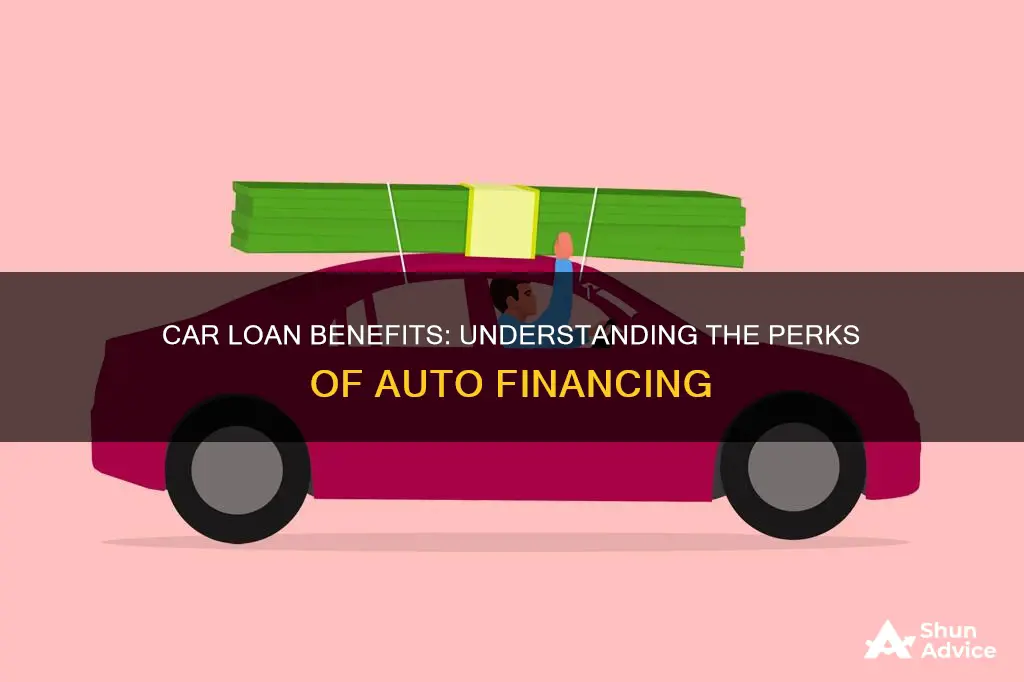
Car loans are a popular way to finance the purchase of a new or used vehicle. They are offered by a variety of lenders, including banks, credit unions, online lenders, and car dealerships. The loan application process typically involves a credit check, and factors such as credit history, income, and loan term impact the interest rate and monthly payments. Car loans can vary in length, commonly ranging from 24 to 84 months, with longer terms resulting in higher overall interest payments. In addition to the principal loan amount, borrowers should consider additional costs such as insurance, taxes, and other fees. Shopping around for the best loan terms and making a larger down payment can help reduce the overall cost of the loan.
| Characteristics | Values |
|---|---|
| Purpose | To provide a lump sum of money to buy a car |
| Lender | Banks, credit unions, online lenders, or dealers |
| Interest rate | Variable or fixed; depends on credit score, loan term, and other factors |
| Down payment | Recommended to be 20% of the total cost of the vehicle |
| Loan term | Typically ranges from 24 to 84 months |
| Pre-qualification | Usually done with a soft credit inquiry |
What You'll Learn

Where to get a car loan
Car loans are a common way to finance a vehicle, and there are several options for where to get one. Here is a guide to help you decide where to get a car loan:
Car Dealerships
One common way to get a car loan is directly through the car dealership. Most new and used car dealerships have partnerships with multiple financial institutions, and they act as the middleman between you and potential lenders. In some cases, a dealership may offer financing directly. This method can be convenient, but it tends to cost more since they collect a fee for the service. Dealerships can lower your monthly payment by extending the loan term, but this may not be a helpful tactic as it increases the time you are in debt and the overall interest you pay.
Banks
Traditional banks, such as PNC Bank, offer car loans. Some banks may allow you to buy a car that isn't fully paid off by the previous owner. However, banks often require a hard credit check, which can impact your credit score.
Credit Unions
Credit unions are nonprofit organisations that often offer lower rates than banks or dealerships, and their local focus allows them to provide good customer service. To secure a loan through a credit union, you usually need to be a member. However, many people qualify for membership without realising it. Credit unions may be patient and willing to work with you to improve your credit score, and they can offer competitive rates.
Online Lenders
There are also online lenders, such as LightStream, that offer auto loans. These lenders often have an easy loan process and no vehicle restrictions. Some online lenders, like CarMax, do not have a minimum credit score requirement, but you may need to provide proof of income and residency.
Other Options
There are also other options for car loans, such as refinancing an existing loan if your credit or financial situation has improved, or saving up for a larger down payment to reduce the loan amount. It is recommended to get pre-approval for a loan and have the funds in hand before shopping for a car, so you know your budget and can avoid a dealership potentially taking advantage of you.
Beto's College Loans: What Does He Owe?
You may want to see also

How to secure a car loan
Check your credit score
Your credit score will give you an idea of the interest rate you can expect and where to apply, as many lenders have a minimum credit score. You can get your credit score for free through your bank, a credit card issuer, or a personal finance company. NerdWallet, for example, offers a free credit score and report.
Compare loan offers
Once you know your credit score, check the average car loan interest rates for borrowers with a similar credit score. This will give you a general idea of the rates you can expect when you start applying for loans. However, other factors such as your credit history will determine your actual rate.
Shop around
Shopping around and comparing your options is the best way to get a car loan at the lowest possible rate. You can consider large national and regional banks, local community banks, credit unions, online auto lenders, and aggregators that match borrowers to loans within a network of lenders. Dealerships often partner with third-party lenders, but you will be limited to offers from lenders in their network, which may not be the best available.
Get pre-approved
Some consumers are hesitant to apply for pre-approval because they believe it commits them to a loan. However, pre-approval simply states how much the institution will lend you and specifies the expected interest rate. It is valid for a certain window, allowing you to secure a rate as you continue shopping around. Pre-approval can also make your time at the dealership less stressful, as you can use it as leverage during negotiations.
Make a down payment
Most lenders won’t lend enough for the full cost of the vehicle. Instead, you’ll usually need to make a down payment. A larger down payment can help you secure a lower interest rate. In most cases, a 20% down payment is recommended.
CapitolOne: Refinancing Loans and Financing Options Explored
You may want to see also

Car loan costs and factors
When you're shopping for a car loan, it's important to understand the different factors that can affect the cost of your loan. Here are some key considerations:
Annual Percentage Rate (APR)
The APR is a critical factor in determining the cost of your car loan. It represents the percentage of the loan principal that you must pay to your lender annually, and it includes both the interest rate and any fees associated with the loan. A lower APR will result in lower overall costs, while a higher APR will increase the total amount you pay. APRs can vary significantly between lenders, so it's essential to shop around and compare offers.
Loan Term
The length of your loan, or loan term, also has a significant impact on the cost. A shorter-term loan will result in higher monthly payments but a lower total cost. On the other hand, a longer-term loan will reduce your monthly payments but increase the total cost of the loan over time. For example, consider a $15,000 loan at a 7.5% APR. With a four-year term, the monthly payment would be $362.69, while a three-year term would increase the monthly payment to $466.60. Extending the loan to five years would lower the monthly payment to $300.57 but result in a higher total cost.
Down Payment
The amount of your down payment can also affect the cost of your car loan. A larger down payment reduces the principal amount of the loan, which in turn lowers the total interest charges. This can result in significant savings over the life of the loan. For example, if you purchase a $25,000 car and make a $5,000 down payment, the principal amount of your loan would be $20,000. A lower principal amount will reduce the overall cost of borrowing.
Credit Score and History
Your credit score and history play a significant role in determining your auto loan rate. Lenders use your credit score to assess the risk of lending to you and set the interest rate accordingly. A higher credit score generally leads to a lower interest rate, while a lower score may result in a higher APR. Improving your credit score and maintaining a strong credit history can help you secure more favourable loan terms.
Lender Type
The type of lender you choose can also impact the cost of your car loan. Credit unions, for instance, often offer lower interest rates and more competitive terms compared to traditional banks or dealerships. Dealerships may offer convenience, but they typically partner with financial institutions and charge a fee for their service, resulting in higher costs.
Additional Factors
Other factors that can influence the cost of your car loan include the purchase price of the vehicle, whether it's new or used, and any applicable taxes or additional fees. Keep in mind that the specific terms and conditions of your loan can also impact the overall cost, so be sure to read the fine print carefully before committing to any loan agreement.
Explore Microfilm: BPL's Lending Options
You may want to see also

Car loan interest rates
Your credit score is a significant factor in determining your interest rate. Lenders use it to assess the likelihood of you repaying the loan. A higher credit score typically results in a lower interest rate. People with credit scores above 780 tend to secure the lowest interest rates, while those below 501 often face higher rates. However, some lenders consider other factors, such as education, to offer competitive rates to borrowers with imperfect credit scores.
Credit unions, such as Southeast Financial Credit Union, often provide the lowest interest rates. They are non-profit organisations with a local focus, ensuring excellent customer service throughout the loan period. Additionally, some lenders, like LightStream, do not impose vehicle restrictions or require appraisals, making their loan process easier than traditional lenders.
It is essential to understand the difference between interest rates and annual percentage rates (APRs). APRs include the interest rate plus any fees charged by the lender. When comparing loan offers, ensure you are comparing the APRs.
Furthermore, car dealerships often have partnerships with financial institutions and can facilitate connections with potential lenders. However, this convenience may come at a cost, as dealerships may charge a fee for this service.
BOA Loan Consolidation: What You Need to Know
You may want to see also

Car loan pre-approval and pre-qualification
Pre-qualification
Pre-qualification is an estimate of what car loan terms you might qualify for. It is a way to gather general information without affecting your credit score. Most auto lenders offer pre-qualification, and in many cases, the applications are available on the lender's website. With pre-qualification, you’ll usually see estimates within minutes. It is not an approval of credit and the estimates you receive in a pre-qualified loan offer are likely to change after a lender completes a full credit check.
Pre-approval
Pre-approval can be considered a step up from pre-qualification. Lenders use a hard credit inquiry, which can slightly lower your credit score. The preapproved loan rate and details are less likely to change. Preapproval requires you to share more personal and financial information with a creditor, as it is essentially a partial application. A preapproval is a formal offer from a lender with conditions. When a lender advertises auto loan pre-qualification or preapproval, it’s always a good idea to ask whether they will use a soft or hard credit inquiry before you apply.
Other options
Car buyers looking for competitive rates and customer service are often best served by credit unions. To secure financing through a credit union, you have to be a member, but most people qualify for membership without even realizing it. Given that credit unions are nonprofit organizations, they may offer lower rates than banks or dealerships, and their local focus allows them to provide exceptional customer service for the length of the loan.
One common way to get a car loan is directly through the car dealership. Most new and used car dealerships have partnerships with multiple financial institutions, and they’ll act as the middleman between you and potential lenders. In some cases, a dealership may offer financing directly. This method may be fairly convenient, but it does tend to cost more since they’ll collect a fee for performing that service.
Borrow Tools from Canadian Tire: What You Need to Know
You may want to see also
Frequently asked questions
Car loans provide a lump sum of money for you to buy a car. You can apply for a car loan at banks, credit unions, online lenders, or at the car dealership itself. The loan term is the length of time you have to pay off the loan. Auto loan terms are usually in 12-month increments, with the most common at 24, 36, 48, 60, 72 and 84 months.
To get the best car loan, it is recommended to apply to several lenders and compare offers. It is also worth noting that the shorter the loan term, the higher your monthly payments will be, but it will also translate into less interest overall.
There are several additional costs and factors associated with car loans, including GAP insurance, which covers the difference between your current loan balance and your car's actual value if an accident occurs.
Some lenders have more flexible credit requirements to help first-time car buyers qualify, although it is often with a higher interest rate.







